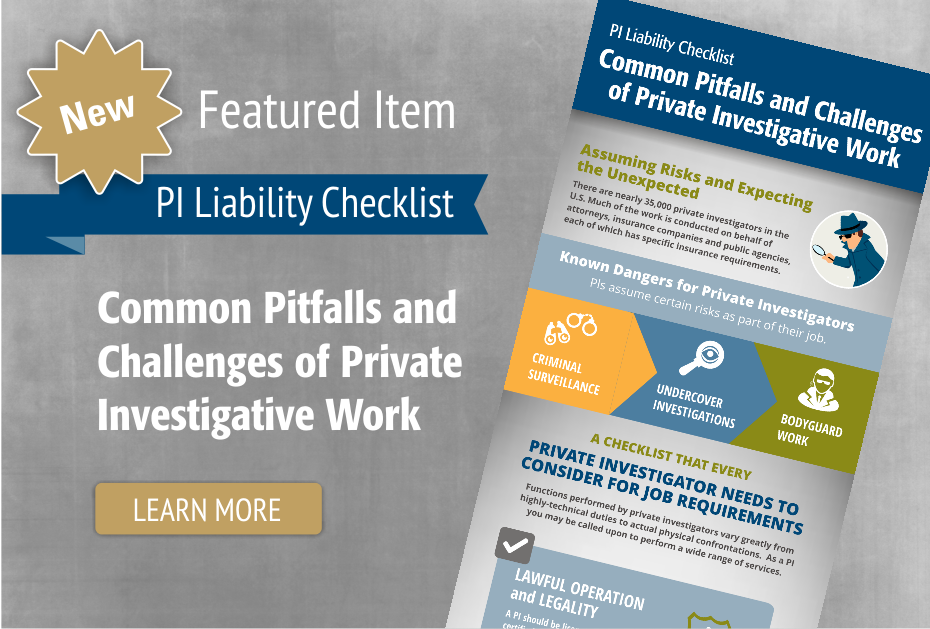Assuming Risks and Expecting the Unexpected
Private investigation work requires communication skills, adept decision making, inquisitiveness, resourcefulness, and patience. Private investigators (PIs) work in a variety of environments, and perform investigations for diverse clientele. While some investigative work is mundane and carries little to no risk, such as background and public records searches, PIs assume certain risks as part of their job. There are known dangers associated with some investigations, including criminal surveillance, undercover investigation, and bodyguard work.
A PI must do their due diligence and prepare to assume risks on the job. Regardless of preparation and planning, PIs need to expect the unexpected and adapt to any circumstance.
Here is a simple checklist addressing the common pitfalls and challenges of PI work.
1. Lawful Operation and Legality
It is important to operate according to the law, especially as a PI. Regardless of how well-intentioned an act of private investigation might be, it may or may not be legal. A PI should be licensed, registered, and/or certified before performing their duties.
Requirements for PIs vary from state to state.
2. Planning for Protection
Sometimes PIs deal with dangerous situations. Whether it’s surveilling criminal activity, guarding an asset, or securing sensitive information, having protection is important. Planning for precarious, and occasionally perilous, situations is a standard part of the job. PIs need to plan for both expected and unexpected dangers. For example, a power surge from a lightning strike that fries a data server can destroy an investigation; similarly, unprotected data is vulnerable to either corruption or destruction by digital attack. Ensure that your data is backed up and is digitally secure. In the 21 st Century, protecting digital information/data can be more useful than carrying a gun. Understanding and utilizing many types of technology, from guns to microchips, are essential for modern investigative work.
3. Gun Use: To Carry or Not To Carry
A lot of PI work does not require the use of a gun. Of course, planning for protection on some jobs might require a PI to carry a gun. Yet, having a gun is not necessarily protective; carrying a gun can lead a person to overconfidence and a distorted sense of power. Before bringing a gun on the job, a PI should be knowledgeable and comfortable using their weapon(s). As such, gun safety and training are more important than gun possession. PIs should understand that guns or other armaments are the last line of defense, to be used with extreme discretion only in instances of imminent bodily harm to oneself or others.
4. Patience: A PI’s Greatest Tool and Easiest Pitfall
The old saying goes that “patience is a virtue”. For a PI, patience must be exercised constantly on the job. Gathering information and collecting data necessitates a great deal of patience, as PIs often wait for long periods of time in order to obtain certain desired facts. Obtaining information/data isn’t just about waiting for the opportune moment; it’s about having the patience to stay alert and focused on the task at hand over mind-numbingly long hours of work. PIs face plenty of distractions on the job, but they must be patient and vigilant in order to succeed. A momentary distraction from the task at hand could mean losing a key piece of information for an investigation. Staying engaged and alert while exercising great patience are paramount for successful PI work.
5. Personal Health Management
Investigative work typically requires many hours of sitting, waiting, observing, and reporting. Gathering information is not a glamorous process. Stakeouts and surveillance are generally long, tedious processes, designed to catch fleeting moments of suspect activities. PIs have to manage both their physical and mental health on the job. Enduring the exhausting schedule of most PI work requires discipline, planning, and patience. Long hours spent sedentary and solitarily can cause a variety of health problems for PIs. Taking preemptive and continuous steps to manage your health are important.
Physical Health
Exercising might not be an option for most PIs on the job, but there are other ways to address your health needs on the job. Easy steps to take for maintaining good physical health include: eating healthful food, stretching, and communicating, either with oneself or to others, at regular intervals. Stretching is a quick and effective way to promote good blood circulation, and it can be done whether you’re seated, standing, or lying down. Communicating at regular intervals helps keep a PI focused and alert, while also enabling them to keep a detailed log/record of activities. Whether you keep personal notes, shoot a video, or occasionally snap some photos, communications are vital to all investigations.
Mental and Emotional Health
For PIs, stresses stem from a number of job-related causes. Investigating criminal or other unsavory activities can result in firsthand experiences with the worst, darkest side of humanity. Whether tracking a suspected identity thief, observing an adulterous spouse, or even encountering evidence of violence or death, the information and knowledge gathered by a PI is often distressing and/or disconcerting. Additional stress for PIs comes from the exhausting work schedule of investigative work. Working long hours, often at odd times of the day and night, without a regular or routine schedule is wearisome, and can place additional stress on one’s family life. Managing one’s stresses is important. There are myriad ways of managing stress: exercise, hobbies, and therapy are effective methods of stress management. Take the time to find a way of managing stress that works for you.
6. Expect the Unexpected: The Importance of Adapting
As a PI, one must be able to adapt to any circumstance. Making well-reasoned split- second decisions, employing deductive and inductive reasoning, and entertaining all sorts of personalities are paramount for successful PI work. Clients and subjects of investigations are often distraught or emotionally charged. People possess an endless variety of personalities and temperaments. Unforeseen circumstances could turn a peaceful discussion into a confrontation. A PI should be prepared to regulate and resolve disputes, and be able to react and respond appropriately to achieve positive results. The ability to interact effectively with almost anyone is a valuable skill for PIs.
While it’s possible to plan for expected risks and hazards of a given job, unexpected things happen. When the unexpected occurs on the job, it’s best to adapt.







